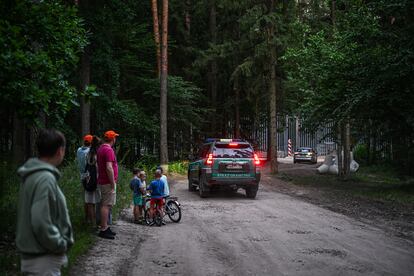A militarized forest to address security concerns in Polish election campaign
The war in Ukraine and threats from Belarus have reinforced Poland’s defense policy, which the ultra-conservative government has applied to migration. However, the inhabitants of the town of Białowieża say they are not afraid


Approaching Białowieża means entering a place that has been frequently mentioned by the ultra-conservatives from Law and Justice (PiS), the ruling party in Poland. The little town – which has just over 2,600 inhabitants – has been a key piece of the PiS’ electoral campaign, with elections coming up on October 15.
The narrow road that leads to this Polish town – which is located next to the border with Belarus – is filled with trees. It’s within the Białowieża Forest, one of the largest remaining parts of the immense primeval forest that once stretched across Europe.
In addition to the trees, there are numerous military and border patrol vehicles. Police checkpoints stop passing cars and search the trunks. The officers have been deployed to control the flow of migrants trying to reach the EU, by crossing the Polish-Belarus border. Since this past summer, reinforcements have arrived, after mercenaries from the Russian Wagner Group moved to Belarus following their failed rebellion against the Kremlin at the end of June. Following that, on August 1, two Belarusian helicopters entered Polish airspace.
With the war in neighboring Ukraine, nobody is surprised that security and defense have become the focus of the campaign to win this coming Sunday’s elections. The campaign slogan of the ruling PiS is “a secure future for the Poles,” while the opposition promises even more firmness and effectiveness.
“We’re a country that borders Russia (with the enclave of Kaliningrad), Belarus and Ukraine,” explains Slawomir Debski, director of the Polish Institute of International Affairs (PISM), a think tank that advises the incumbent government. In his office in Warsaw, the security expert recalls the “hybrid attacks” made by the regime of Aleksandr Lukashenko – a major ally of Vladimir Putin – who, since 2021, has facilitated the irregular entry of migrants into the EU. “For obvious reasons, security is a concern for Polish society,” Debski continues.
However, residents and businesspeople in Białowieża – a town at the epicenter of some of these threats – show no signs of fear before the elections. On the contrary, some feel that they’re suffering from the government’s alarmist narrative.
Krzysztof Petruk, the 62-year-old principal of the village school, sees no fear among his students or their parents. “I don’t think there are more than 1,000 Wagner mercenaries… and the thing about the Belarusian helicopters was only one time, we don’t know if it was a joke or serious,” he chuckles, downplaying some of the reasons that the government gave for justifying the deployment of more soldiers to the area. Still, he views the military presence favorably, remembering that, in 2021 – when the government declared a state of emergency due to the arrival of immigrants – “there were more soldiers than inhabitants.”
“The children have already gotten used to it,” he says, although he acknowledges that “many parents don’t like to see so many armed soldiers [around].”
Two elderly ladies who refuse to stop for a longer conversation briefly affirm that they feel very calm about the military reinforcement. As does Emile, a 44-year-old social worker who watched the incursion of the Minsk helicopters in fear. However, for Alicia, a 61-year-old shop assistant who also doesn’t wish to provide her last name, “the presence of soldiers never has a positive connotation.” “They make people feel insecure,” she notes.
In addition to the military threat from Russia on the other side of the border, Poland’s far-right government has turned immigration into an issue of national security and sovereignty. In the referendum that will be held alongside the general elections, two of the four questions on the ballot refer to this issue. One calls for rejecting the EU’s pact regarding protections for refugees and the distribution of migrants between member countries. The other asks if the population is in favor of removing the 120-mile-long fence built on the border with Belarus, as if the opposition had suggested tearing it down. On the contrary, the conservative-liberal Civic Platform – which placed second in the 2019 elections – calls for strengthening border controls.
During the campaign, Prime Minister Mateusz Morawiecki has bombarded the public with videos and statements, in which he relates irregular immigration from Muslim-majority countries with violence. He has also stated that Wagner’s mercenaries could enter Poland disguised among the migrants.
Fear of the dead
In Białowieża – where many residents have encountered the people entering from Belarus – the fear instigated by official messages isn’t palpable. “Many parents have helped [the migrants] with food, water and clothing,” the school director says. Shopkeeper Alicia remembers that, since 2021 – the peak of the migration crisis – “there hasn’t been any incident with the population.”
“I’m not afraid of migrants,” she adds. “What’s most scary is finding a dead person 30 or 40 [feet] from your house,” she sighs, referring to the dozens of people who have lost their lives in the forest.
Aleksandra Chrzanowska, a 44-year-old activist who has been working on the border since 2021, states emphatically: “I have never met a single person in the forest who scared me.” This cultural mediator who works with SIP – a legal aid organization for foreigners – and Grupa Granica – a collective made up of NGOs, activists and residents in the border area – says that some residents call them to help when they see a group of people in the forest, while others collaborate with the border guards. There are different reactions, he explains, but no fear. “[Those arriving] are very tired people, cold, hungry, often hurt.”
The border forest has become a militarized zone. This past Tuesday, at the start of the cobbled road that leads from the town to the fence, a truck with armed soldiers was on duty. Further ahead, there was a 4x4 vehicle from the Border Guard. An officer with pink nails and painted eyebrows warned that it’s forbidden to approach more than a few dozen feet from the wall. According to a spokeswoman for the security agency, there have been 22,000 attempts to cross the fence so far in 2023. However, activists denounce that the authorities also are counting those who merely approach the fence, while double-counting those who try again after having been initially turned away.
Slawomir Dron, 54, is the owner of Fanaberia restaurant. He laments the economic situation, while standing in his nearly-empty establishment. “Before, people were attracted by nature, the bison, the forest… nowadays, the message is that there are migrants, Wagner [mercenaries]… danger, danger, danger!” Since this past summer, when the government intensified these messages, business fell and hasn’t recovered. The manager of Hotel Żubrówka – Andrzej Malinowski, 60 – also complains that “all the things they say on television discourage families” from visiting the area.
For Marcin Buzanski, a security expert and analyst at the Warsaw-based Pulaski Foundation, the government’s reaction at the border is “very exaggerated.” On the one hand, the entry of migrants is portrayed as a major threat, while, on the other, Poland rejects the support of Frontex – the European agency that coordinates border management. The expert believes that this anti-immigration narrative has been twisted by the ruling party. Although, he notes – with a recent scandal involving the sale of Polish work permits to immigrants in exchange for bribes – the PiS has revealed its “hypocrisy” on the subject.
Investment in the military
Buzanski doesn’t hesitate, however, to describe a “deterioration of the security situation,” although he sees an electoral use of issues related to security by the PiS to “attract far-right voters and get their base mobilized.”
In April of 2022 – shortly after Russia’s invasion of Ukraine – the government approved the Homeland Defense Law, which aims to turn the Polish Armed Forces into the strongest in Europe. Since this legislation was enacted, various arms purchases have taken place, with the objective of eventually devoting 4% of GDP to military spending.
Piotr Lukasiewicz, a former diplomat and ex-military man, with experience in countries such as Afghanistan, believes that the government, with this “intense, rapid and broad plan to modernize the army” began the electoral campaign “with a solid program.” But, he cautions, “they overheated the situation, they exaggerated… and they’ve had somewhat grotesque results.” The analyst from the Polityka Insight think tank recalls some “incidents” that have undermined the image that the PiS wants to project.
The first was that – after ensuring that the country was protected from aerial missiles last October – two people were killed in November, in the Polish village of Przewodów, next to the Ukrainian border. They were victims of a missile from the Ukrainian defense system. Then, in December, a projectile launched by Russia entered Polish airspace. Radars lost track of it. Nobody knew anything until a woman found the remains of the projectile in a forest in Bydgoszcz, more than 250 miles from the border with Belarus, from where it came. Defense Minister Mariusz Blaszczak proceeded to blame Poland’s military leadership for not having informed him.
Lukasiewicz – a former colonel – highlights a recent episode that made a former colleague of his cry out with helplessness. It was on September 17: the minister of defense released classified documents of old military plans in case of a Russian attack, while accusing the opposition of wanting to cede the eastern half of the country to Moscow. This past week, the unrest at the top of the army crystallized, with the resignation of the two highest-ranking generals, just five days before the elections. “They’ve done it on purpose as revenge: it’s a protest [against the government], for having used the army the way that they have over the last six months,” Lukasiewicz explains.
Meanwhile, the pro-government expert Debski – addressing the deployment in Białowieża – believes that “the danger is real, due to the geographical situation and the role that Poland has played against Russia in the war in Ukraine.”
“Let’s imagine what could have happened if [the government] had ignored these threats and something bad had happened,” he suggests. But Alicia – behind the counter of the store where she works – believes that, behind the hundreds of soldiers and police officers that swarm around her town, there’s more pre-election propaganda than danger.
Sign up for our weekly newsletter to get more English-language news coverage from EL PAÍS USA Edition
Tu suscripción se está usando en otro dispositivo
¿Quieres añadir otro usuario a tu suscripción?
Si continúas leyendo en este dispositivo, no se podrá leer en el otro.
FlechaTu suscripción se está usando en otro dispositivo y solo puedes acceder a EL PAÍS desde un dispositivo a la vez.
Si quieres compartir tu cuenta, cambia tu suscripción a la modalidad Premium, así podrás añadir otro usuario. Cada uno accederá con su propia cuenta de email, lo que os permitirá personalizar vuestra experiencia en EL PAÍS.
¿Tienes una suscripción de empresa? Accede aquí para contratar más cuentas.
En el caso de no saber quién está usando tu cuenta, te recomendamos cambiar tu contraseña aquí.
Si decides continuar compartiendo tu cuenta, este mensaje se mostrará en tu dispositivo y en el de la otra persona que está usando tu cuenta de forma indefinida, afectando a tu experiencia de lectura. Puedes consultar aquí los términos y condiciones de la suscripción digital.








































